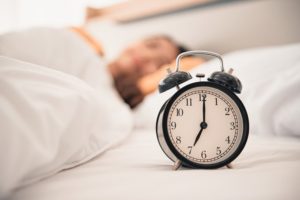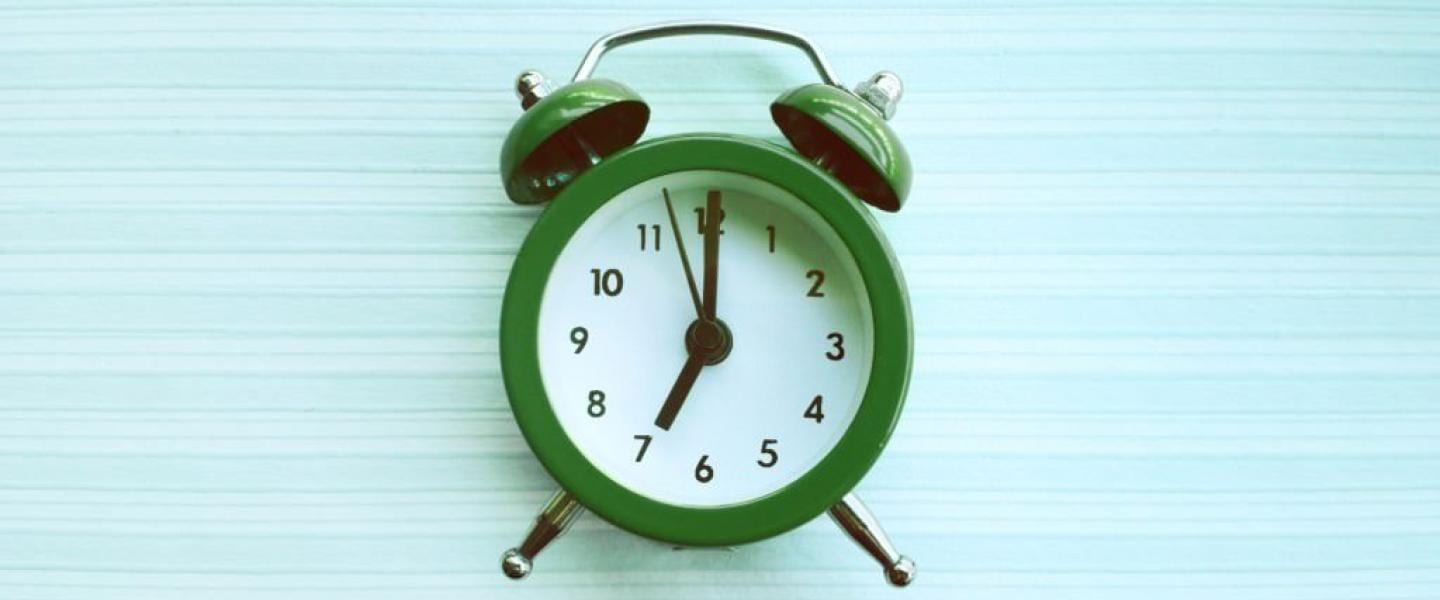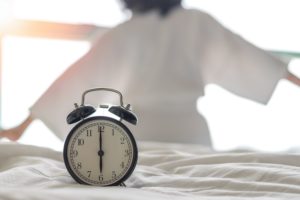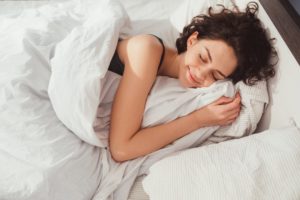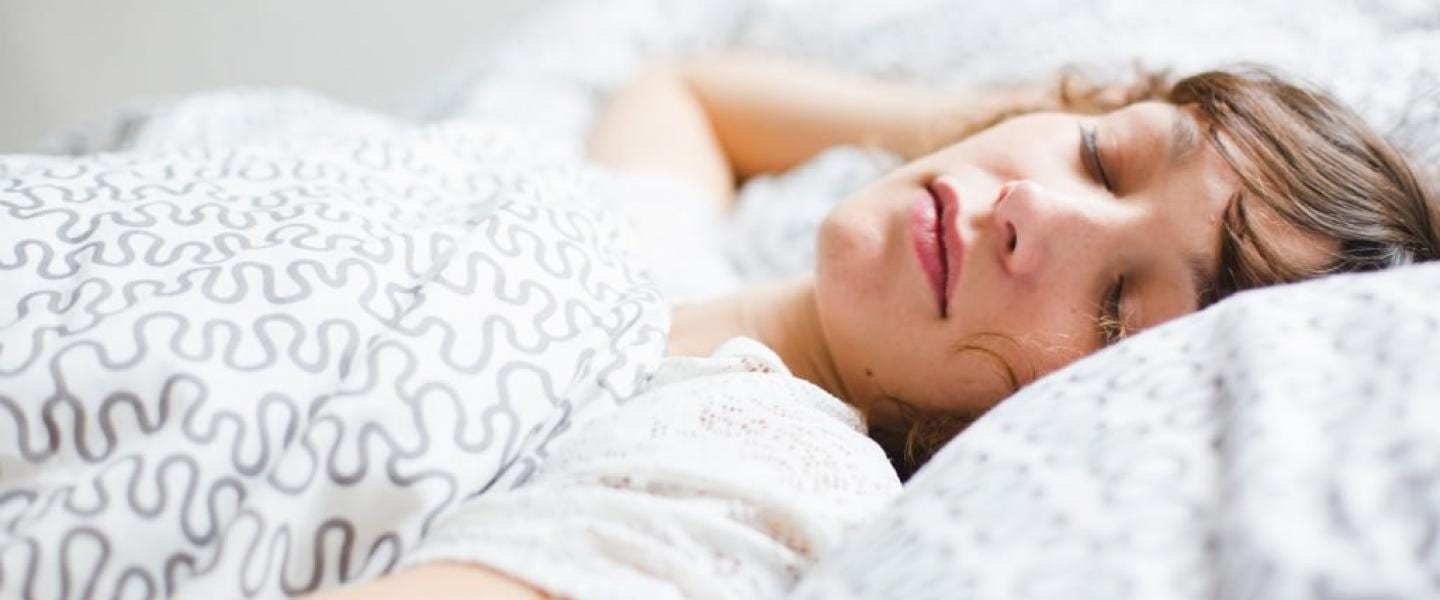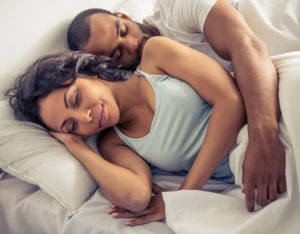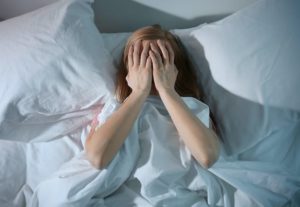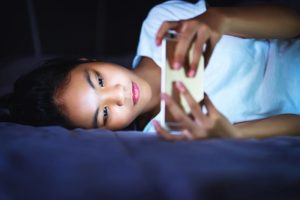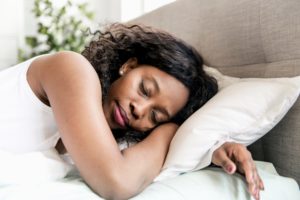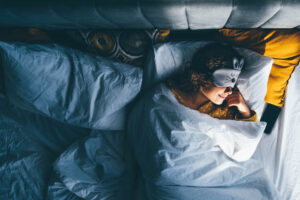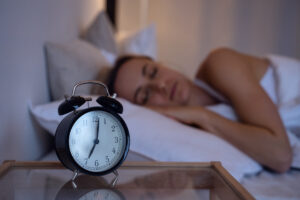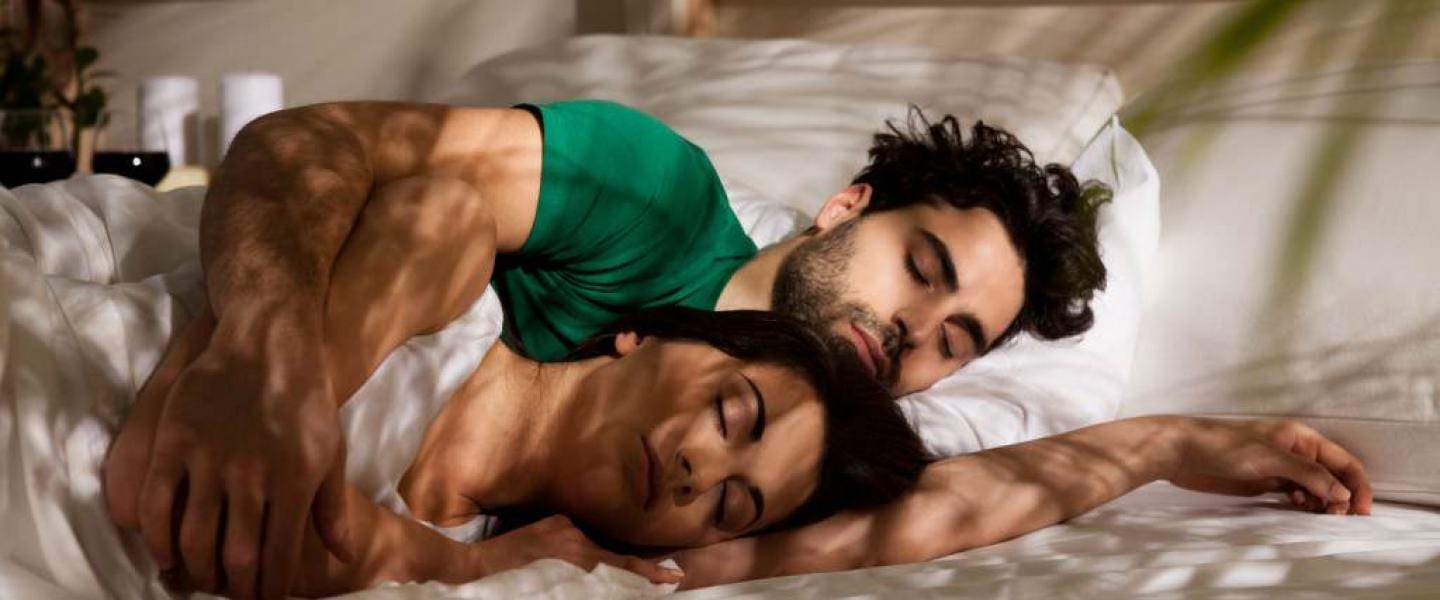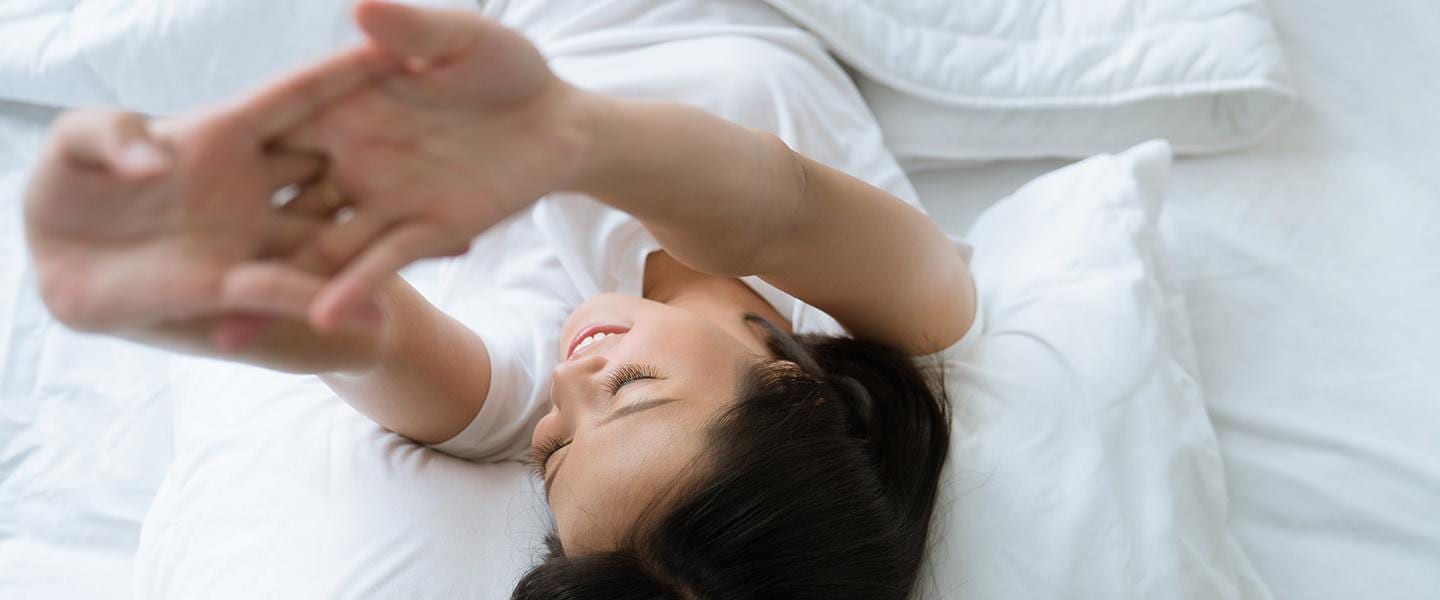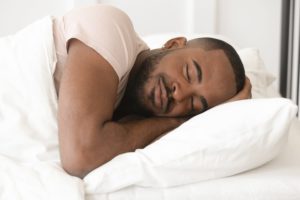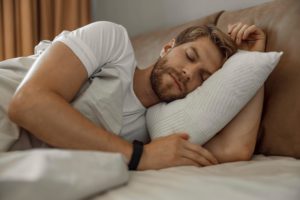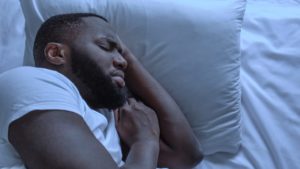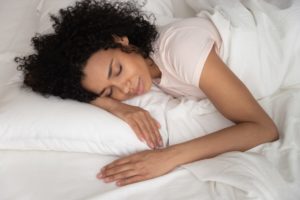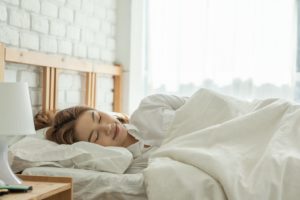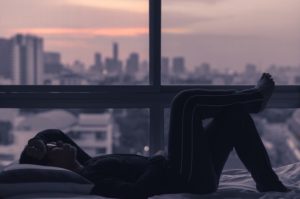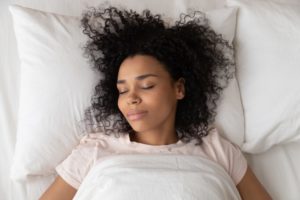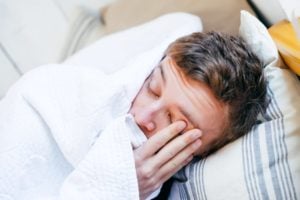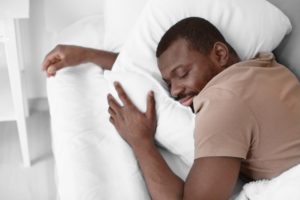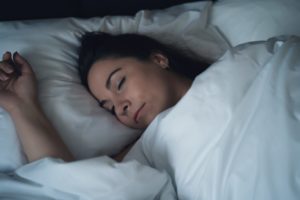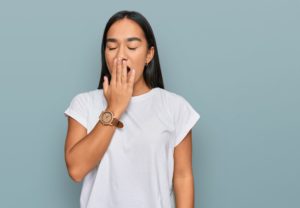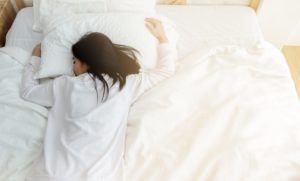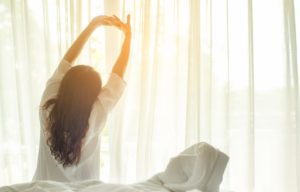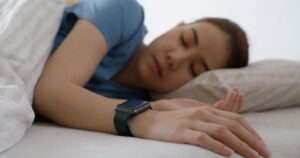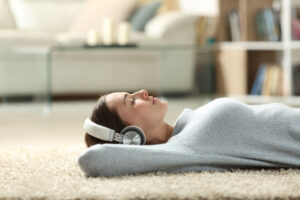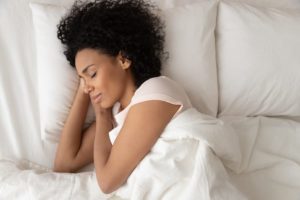When you buy through our links, we may earn a commission. Products or services may be offered by an affiliated entity. Learn more.
Do Moon Phases Affect Your Sleep?
People have speculated about the moon’s impact on human health and behavior for millennia. Ancient Roman philosopher Pliny the Elder claimed that the moon could “penetrate all things” and theorized about its influence on tides, marine life, plants, animals, and human activity. While science has since explained some lunar phenomena, like tides and eclipses, much is still shrouded in mystery.
Perhaps the most pervasive lunar legend is the moon’s ability to affect nighttime behavior. There is no shortage of tales recounting nocturnal mayhem, sleep disturbances, and insomnia driven by the moon’s untold power. But is there anything to the folklore? Modern research methods have shed new light on the relationship between moon phases and sleep.
What Are Moon Phases?
The moon’s mysticism stems from its nightly metamorphosis. Some evenings this floating orb is full and lustrous, only to be reduced to a faint crescent before disappearing weeks later. While the moon appears to undergo a physical transformation night by night, this is merely an illusion created by a sophisticated astronomical dance.
The moon does not produce its own light but instead is illuminated by the sun. Depending on where the sun, moon, and Earth are in relation to each other, different amounts of reflected sunlight are visible from Earth. Our shifting terrestrial perspective creates the moon’s ever-changing shape.
Beginning with a complete disc (full moon), the moon appears to gradually shrink night by night until it becomes completely invisible (new moon). At that point, the moon slowly fills back in until the disc is complete again. It takes 29.5 days for the moon to cycle through this process completely.
The moon’s cyclical transformation is divided into eight phases, with each indicating the precise shape created by visible reflecting sunlight and whether the shape is in the process of increasing (waxing) or decreasing (waning). The eight phases are: new moon, waxing crescent, first quarter, waxing gibbous, full moon, waning gibbous, third quarter, and waning crescent. Each phase correlates to distinct positions of the moon, Earth, and sun.
It should also be noted that the moon appears in a different part of the sky each night as it makes its monthly orbit around Earth. This repositioning affects the timing of moonrise and moonset, delaying moonrise by about 50 minutes each day. A full moon only occurs when it is opposite from the Earth and sun and thus rises in the evening and sets in the morning. By the time the moon reaches the new moon phase, it is aligned with the sun and the two rise and set together.
Looking to improve your sleep? Try upgrading your mattress.
Can Moon Phases Affect Sleep?
The lunar impact on biological rhythms is well documented in the natural world. Variations in tree diameter, reproductive patterns of crabs, spawning events in the Great Barrier Reef, and the nighttime activity of owl monkeys may all be affected by lunar cycles. Research on the potential for moon phases to affect humans is less clear—most studies are small with somewhat inconsistent findings.
Nevertheless, compelling evidence suggests that lunar cycles may compromise sleep, with the full moon phase being most disruptive.
One sleep study analysis found that the full moon was associated with worse sleep using several metrics. During this lunar phase, participants took five minutes longer to fall asleep, slept for 20 minutes less, took longer to reach REM sleep, experienced a 30% reduction in deep sleep, and reported reduced sleep quality.
Another study found that total sleep time during the full moon was reduced by 25 minutes while arousals and awakenings increased. However, participants in this study took longer to reach REM during the new moon, contradicting prior research. A third analysis reviewed data from 319 people undergoing a one-night sleep study. Those observed during a full moon had lower sleep efficiency, less deep sleep, and delayed time reaching REM sleep.
In perhaps the most extensive study on this topic, researchers analyzed sleep patterns in three indigenous Argentinian communities and 464 American college students living in a major city. Regardless of location and amount of artificial light exposure, all groups fell asleep later and slept for less time in the week preceding the full moon.
Why Would the Moon Affect Sleep?
Moonlight
Many people theorize that a full moon causes sleep disruption because of the amount of sunlight reflected back to Earth. The body’s internal 24-hour clock is calibrated by rising and falling levels of hormones formed in response to light perception. Therefore, light levels are one of the most significant influences on sleep onset and quality.
However, there are concerns about the moon’s luminance as the primary mechanism for sleep disruption. Moonlight brightness is only 7% the strength of direct sunlight, which is a relatively low intensity. People are frequently exposed to far more artificial light at night than the amount reflected by the moon. Furthermore, research studies on sleep disruption during the full moon were often conducted on cloudy nights or in closed, windowless environments.
Electromagnetism
Another hypothesis gaining popularity is the moon’s ability to cause electromagnetic fluctuations on Earth. Earth’s electromagnetic field has a long tail or “magnetotail” shaped by solar winds. As the moon orbits Earth each month, it passes through the magnetotail during the full moon phase and becomes negatively charged. The moon’s magnetic charge can then influence Earth’s electromagnetic field through a sophisticated feedback process.
Research now suggests that humans may be sensitive to low-level geomagnetic variations. Other geomagnetic events (such as geomagnetic storms and the aurora borealis/australis [Northern/Southern Lights]) that produce geomagnetic fluctuations comparable with the moon’s impact have been connected to a range of health effects, including headaches, changes in blood pressure and blood flow, heart rate variability, and even heart attack.
While the precise biological basis for these changes is unclear, research points to several mechanisms involving the body’s hormone levels, DNA breaks, and inflammation.
Gravity
The idea that the moon’s gravitational pull affects human health is based on the fact that the human body is mostly water, and lunar gravity has a noticeable effect on ocean tides. Critics of this theory cite that the gravitational pull of the moon is extraordinarily small in humans. Researchers estimate that the impact of lunar tides on a person measures less than one-millionth of the size of an atom.
The moon’s gravitational pull is also roughly equal during the full moon and new moon. Therefore, any sleep changes that occur during a singular lunar phase are unlikely to be caused by changes in gravity alone.
Does the Moon Phase Affect Sleep in Children?
The effect of moon phases on pediatric sleeping patterns is not well researched, and the limited data is murky. A study of nearly 6,000 children in 12 countries found that sleep duration was merely 1% shorter during the full moon compared with the new moon phase. Another analysis actually found that children slept more during the full moon. Interestingly, the researchers attributed the extra sleep to increased daytime activity, but how the moon might affect activity levels in children is unknown.
A German research study looked for a relationship between the lunar cycle, sleep, and physical activity in 1,400 teenagers. After collecting data for three years, there was no identifiable association between the moon phase and sleep or activity levels.
The Moon, Sleep, and Mental Health
The potential lunar impact on sleep may be particularly significant to people with mental health disorders, as many of these conditions have a bidirectional relationship with sleep. In fact, the word “lunacy” is derived from “Luna,” the Roman moon goddess.
Recent research has highlighted a possible relationship between moon phase and symptoms of bipolar disorder. In one study, patients’ mood cycles frequently synchronized with lunar cycles throughout 37 years. Subsequent small studies have also demonstrated a link between moon phase and bipolar mood cycles, although the exact basis for this is unclear.
The impact of the lunar cycle on other mental health disorders, such as anxiety and depression, has been a source of speculation. However, multiple researchstudies evaluating the connection between moon phase, anxiety, and depression have not found evidence of a relationship.
Are There Gender-Specific Lunar Effects on Sleep?
The moon’s impact on female fertility has been debated since ancient times. Many believe that the moon phase controls menstrual cycles and affects fertility. If this is true, then it’s reasonable to conceive a mechanism by which the moon impacts sleep by acting on female hormones. It’s well established that sleep issues can result from hormonal changes during menstruation, pregnancy, and menopause.
Modern research investigating the relationship between moon phase, female reproductive patterns, and sleep is conflicting. One study spanning 15 years found that participants’ menstrual cycles intermittently synchronized with the lunar phase, with menses occurring just before the full moon or new moon.
An analysis of data from women using a period-tracking smartphone app looked for an association between sleep onset, menstruation, and lunar phase. Menstruation and moon phase were not correlated. However, those with periods that started when the moon was more than half full reported better sleep. Women whose cycles began when the moon was less than half full generally had worse sleep.
Research comparing the effects of moon phase on sleep between genders is scarce. Yet, a few studies have noteworthy findings. In another study comparing lunar phase and sleep patterns, female participants had reduced sleep time, less Stage 4 sleep, and less REM sleep around the full moon. Male participants had increased REM during the full moon. Other studies have noted modest differences in sleeping metrics between men and women during the full moon, but results are inconsistent and often conflicting.
Tips for Sleeping Better
While there is some striking research indicating that the moon’s phase may affect sleep, at this point, the research is only suggestive. There is much we do not understand on this topic. Fortunately, there are evidence-based strategies that you can use to sleep well tonight, regardless of celestial influence.
Improving your sleep hygiene is one of the most approachable, helpful ways to get a good night’s sleep. This involves adjusting your bedroom environment and practicing certain behaviors to set you up for successful slumber. Simple things like making sure your bedroom is dark, limiting caffeine, avoiding blue light, and keeping a sleep schedule can go a long way.

Still have questions? Ask our community!
Join our Sleep Care Community — a trusted hub of product specialists, sleep health professionals, and people just like you. Whether you’re searching for the perfect mattress or need expert sleep advice, we’ve got you covered. Get personalized guidance from the experts who know sleep best.
References
19 Sources
-
Casiraghi, L., Spiousas, I., Dunster, G. P., McGlothlen, K., Fernández-Duque, E., Valeggia, C., & de la Iglesia, H. O. (2021). Moonstruck sleep: Synchronization of human sleep with the moon cycle under field conditions. Science Advances, 7(5), eabe0465.
https://pubmed.ncbi.nlm.nih.gov/33571126/ -
Barlow, P. W., Mikulecký, M., Sr, & Střeštík, J. (2010). Tree-stem diameter fluctuates with the lunar tides and perhaps with geomagnetic activity. Protoplasma, 247(1-2), 25–43.
https://pubmed.ncbi.nlm.nih.gov/20393759/ -
Kronfeld-Schor, N., Dominoni, D., de la Iglesia, H., Levy, O., Herzog, E. D., Dayan, T., & Helfrich-Forster, C. (2013). Chronobiology by moonlight. Proceedings. Biological Sciences, 280(1765), 20123088.
https://pubmed.ncbi.nlm.nih.gov/23825199/ -
Cajochen, C., Altanay-Ekici, S., Münch, M., Frey, S., Knoblauch, V., & Wirz-Justice, A. (2013). Evidence that the lunar cycle influences human sleep. Current Biology : CB, 23(15), 1485–1488.
https://pubmed.ncbi.nlm.nih.gov/23891110/ -
Smith, M., Croy, I., & Persson Waye, K. (2014). Human sleep and cortical reactivity are influenced by lunar phase. Current Biology : CB, 24(12), R551–R552.
https://pubmed.ncbi.nlm.nih.gov/24937276/ -
Turányi, C. Z., Rónai, K. Z., Zoller, R., Véber, O., Czira, M. E., Újszászi, Á., László, G., Szentkirályi, A., Dunai, A., Lindner, A., Szőcs, J. L., Becze, Á., Kelemen, A., Lendvai, Z., Molnar, M. Z., Mucsi, I., & Novák, M. (2014). Association between lunar phase and sleep characteristics. Sleep Medicine, 15(11), 1411–1416.
https://pubmed.ncbi.nlm.nih.gov/25266502/ -
Casiraghi, L., Spiousas, I., Dunster, G. P., McGlothlen, K., Fernández-Duque, E., Valeggia, C., & de la Iglesia, H. O. (2021). Moonstruck sleep: Synchronization of human sleep with the moon cycle under field conditions. Science Advances, 7(5), eabe0465
https://pubmed.ncbi.nlm.nih.gov/33571126/ -
Science Mission Directorate. (2008, April 17). Earth’s Magnetic Field Does Strange Things to the Moon. NASA Science.
https://science.nasa.gov/science-news/science-at-nasa/2008/17apr_magnetotail -
Foster, R. G., & Roenneberg, T. (2008). Human responses to the geophysical daily, annual and lunar cycles. Current Biology : CB, 18(17), R784–R794.
https://pubmed.ncbi.nlm.nih.gov/18786384/ -
Chaput, J. P., Weippert, M., LeBlanc, A. G., Hjorth, M. F., Michaelsen, K. F., Katzmarzyk, P. T., Tremblay, M. S., Barreira, T. V., Broyles, S. T., Fogelholm, M., Hu, G., Kuriyan, R., Kurpad, A., Lambert, E. V., Maher, C., Maia, J., Matsudo, V., Olds, T., Onywera, V., Sarmiento, O. L., … Sjödin, A. M. (2016). Are Children Like Werewolves? Full Moon and Its Association with Sleep and Activity Behaviors in an International Sample of Children. Frontiers in Pediatrics, 4, 24.
https://pubmed.ncbi.nlm.nih.gov/27047907/ -
Sjödin, A., Hjorth, M. F., Damsgaard, C. T., Ritz, C., Astrup, A., & Michaelsen, K. F. (2015). Physical activity, sleep duration and metabolic health in children fluctuate with the lunar cycle: science behind the myth. Clinical Obesity, 5(2), 60–66.
https://pubmed.ncbi.nlm.nih.gov/25808903/ -
Smith, M. P., Standl, M., Schulz, H., & Heinrich, J. (2017). Physical activity, subjective sleep quality and time in bed do not vary by moon phase in German adolescents. Journal of Sleep Research, 26(3), 371–376.
https://pubmed.ncbi.nlm.nih.gov/27928860/ -
Wehr T. A. (2018). Bipolar mood cycles and lunar tidal cycles. Molecular Psychiatry, 23(4), 923–931.
https://pubmed.ncbi.nlm.nih.gov/28115741/ -
Avery, D. H., Alexander, E. M., & Wehr, T. A. (2019). Synchrony between bipolar mood cycles and lunar tidal cycles ended after initiation of light treatment and treatment of hypothyroidism. Journal of Psychiatric Practice, 25(6), 475–480.
https://pubmed.ncbi.nlm.nih.gov/31821225/ -
Foster, R. G., & Roenneberg, T. (2008). Human responses to the geophysical daily, annual and lunar cycles. Current Biology : CB, 18(17), R784–R794.
https://pubmed.ncbi.nlm.nih.gov/18786384/ -
Dean-Jones, L. (1989). Menstrual Bleeding according to the Hippocratics and Aristotle. Transactions of the American Philological Association (1974-), 119, 177-191.
-
Helfrich-Förster, C., Monecke, S., Spiousas, I., Hovestadt, T., Mitesser, O., & Wehr, T. A. (2021). Women temporarily synchronize their menstrual cycles with the luminance and gravimetric cycles of the Moon. Science Advances, 7(5), eabe1358.
https://pubmed.ncbi.nlm.nih.gov/33571128/ -
Komada, Y., Sato, M., Ikeda, Y., Kami, A., Masuda, C., & Shibata, S. (2021). The relationship between the lunar phase, menstrual cycle onset and subjective sleep quality among women of reproductive Age. International Journal of Environmental Research and Public Health, 18(6), 3245.
https://pubmed.ncbi.nlm.nih.gov/33801068/ -
Della Monica, C., Atzori, G., & Dijk, D. J. (2015). Effects of lunar phase on sleep in men and women in Surrey. Journal of Sleep Research, 24(6), 687–694.
https://pubmed.ncbi.nlm.nih.gov/26096730/



